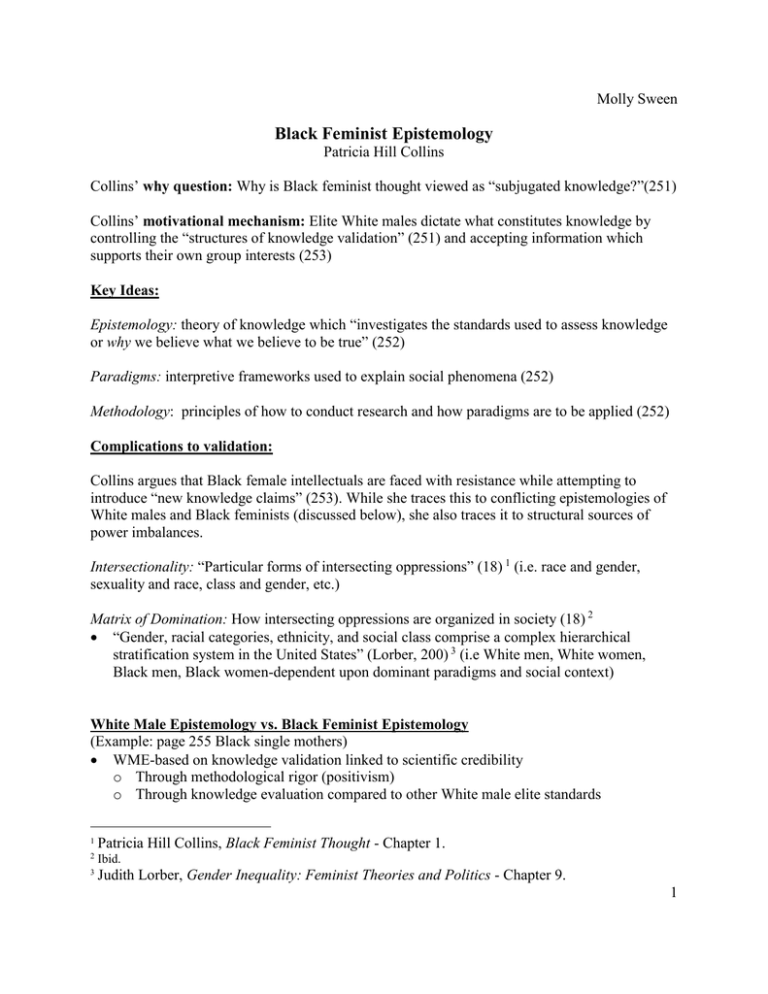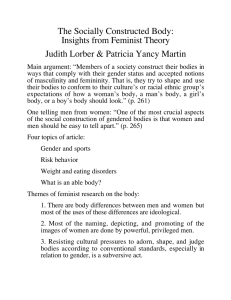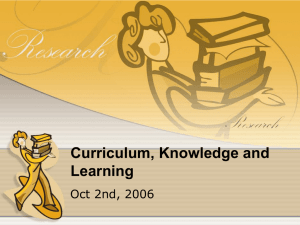Black Feminist Epistemology
advertisement

Molly Sween Black Feminist Epistemology Patricia Hill Collins Collins’ why question: Why is Black feminist thought viewed as “subjugated knowledge?”(251) Collins’ motivational mechanism: Elite White males dictate what constitutes knowledge by controlling the “structures of knowledge validation” (251) and accepting information which supports their own group interests (253) Key Ideas: Epistemology: theory of knowledge which “investigates the standards used to assess knowledge or why we believe what we believe to be true” (252) Paradigms: interpretive frameworks used to explain social phenomena (252) Methodology: principles of how to conduct research and how paradigms are to be applied (252) Complications to validation: Collins argues that Black female intellectuals are faced with resistance while attempting to introduce “new knowledge claims” (253). While she traces this to conflicting epistemologies of White males and Black feminists (discussed below), she also traces it to structural sources of power imbalances. Intersectionality: “Particular forms of intersecting oppressions” (18) 1 (i.e. race and gender, sexuality and race, class and gender, etc.) Matrix of Domination: How intersecting oppressions are organized in society (18) 2 “Gender, racial categories, ethnicity, and social class comprise a complex hierarchical stratification system in the United States” (Lorber, 200) 3 (i.e White men, White women, Black men, Black women-dependent upon dominant paradigms and social context) White Male Epistemology vs. Black Feminist Epistemology (Example: page 255 Black single mothers) WME-based on knowledge validation linked to scientific credibility o Through methodological rigor (positivism) o Through knowledge evaluation compared to other White male elite standards 1 Patricia Hill Collins, Black Feminist Thought - Chapter 1. 2 Ibid. 3 Judith Lorber, Gender Inequality: Feminist Theories and Politics - Chapter 9. 1 BFE-four dimensions which are in stark contrast to White elite male formulations of knowledge o Positivism forces the Black female researcher to “decontextualize” themselves from their research o If knowledge is gathered through alternate mechanisms, their knowledge may never be fully validated Four Dimensions of Black Feminist Epistemology 1. 2. 3. 4. Lived experience as criterion of meaning Use of dialogue Ethic of personal accountability Ethic of caring Barriers to Legitimizing a Black Feminist Epistemology Standpoint feminism: “Our social location shapes our view of the world, but the viewpoints of marginalized “others,” such as women, transgenders, members of the working-class, people in disadvantaged racial ethnic groups, and people in developing countries, do not enter the production of most knowledge” (Lorber, 183)4 Exclusion (of Black women) from the process of knowledge validation o Literacy and education o Lack of access to faculty and administrative positions of authority o Allow a few “safe” African Americans women in…less likely to challenge taken-forgranted assumptions Validating Knowledge from a Black Feminist Standpoint Alternative knowledge claims are routinely ignored, discredited, or viewed as marginal (270), but alternative knowledge claims “challenge all certified knowledge and open up the question of whether what has been taken to be true can stand the test of alternative ways of validating truth” (271) 4 Judith Lorber, Gender Inequality: Feminist Theories and Politics - Chapter 8. 2 Impermeable Knowledge Validation White male epistemological knowledge is hard to penetrate. Although alternate epistemologies attempt to introduce new knowledge claims, the mechanisms through which these knowledge claims are reached are viewed as non-credible by those who control the “structures of knowledge validation” (251) Black Feminist Epistemology Alternate Epist. K K K White Male Epistemology “Truth” Alternate Epist. K Alternate Epist. K Alternate Epist. 3 K=Knowledge






